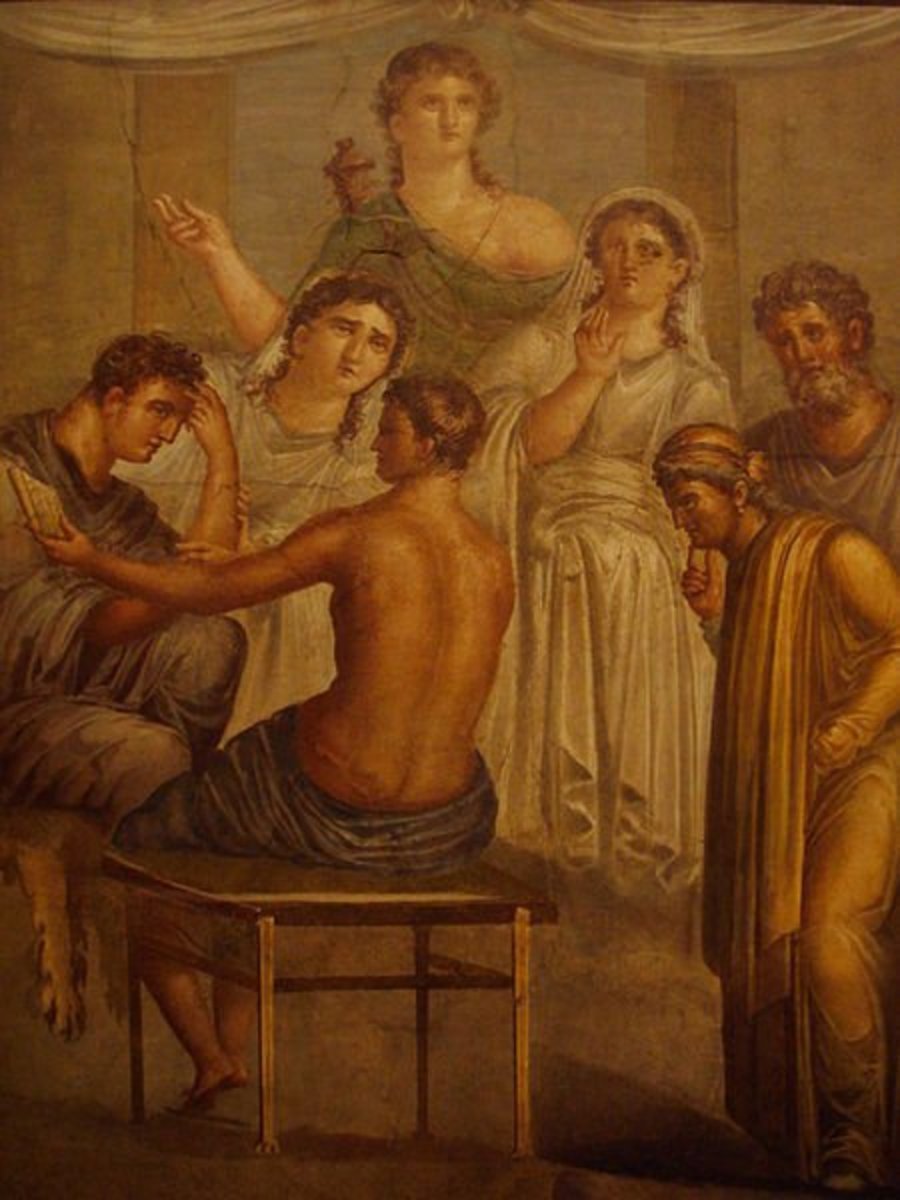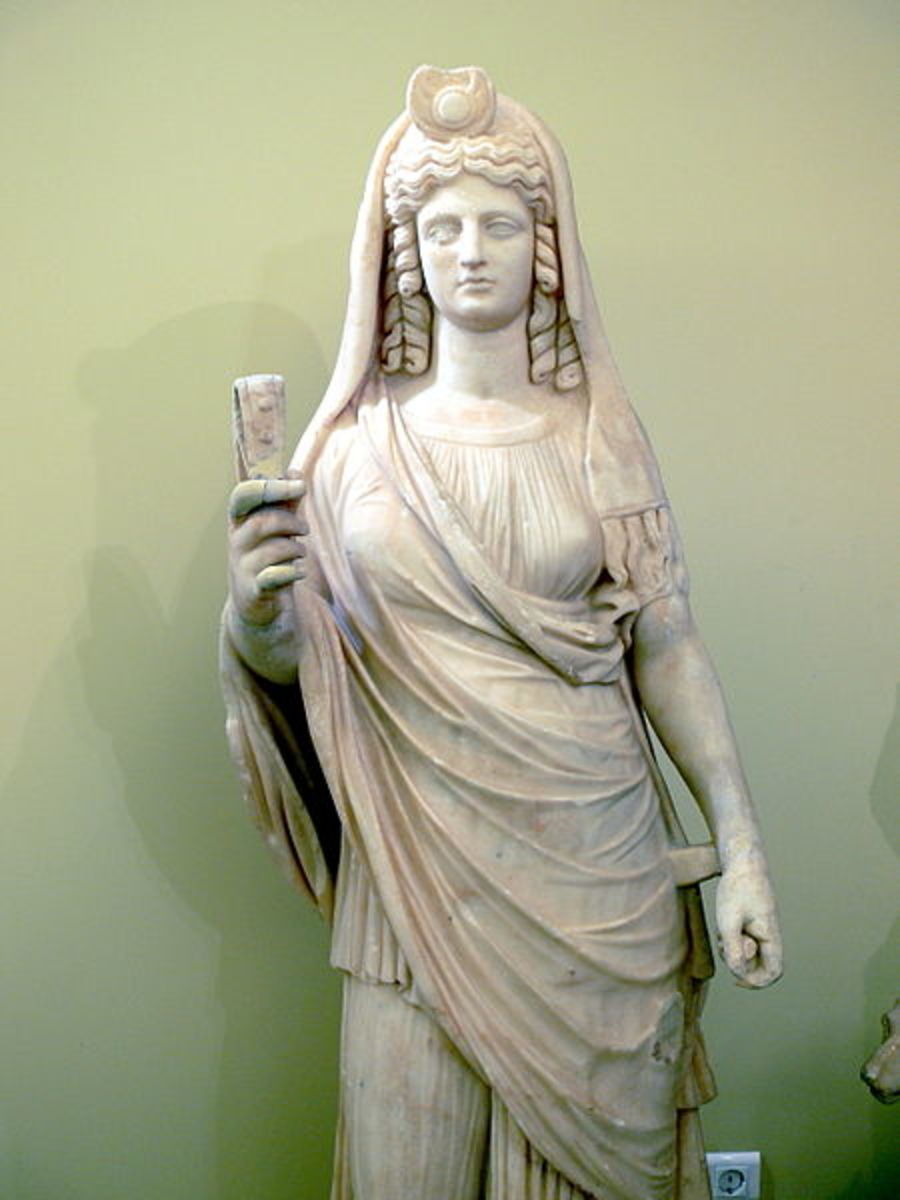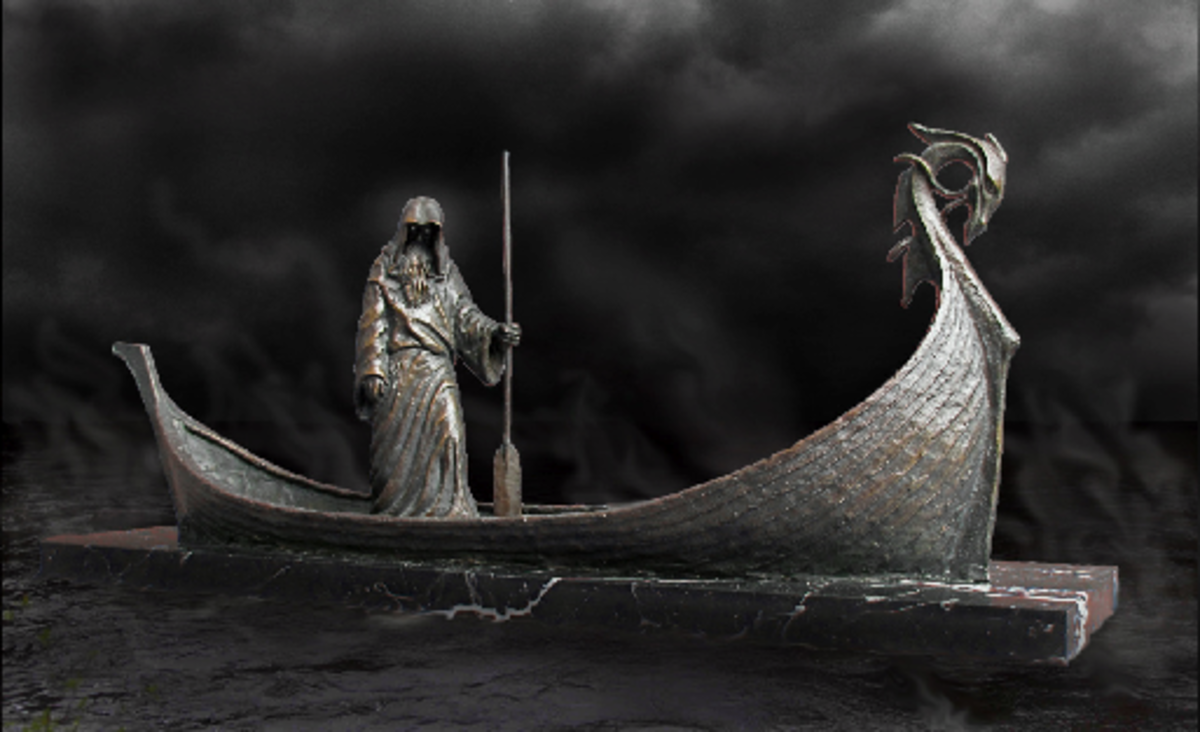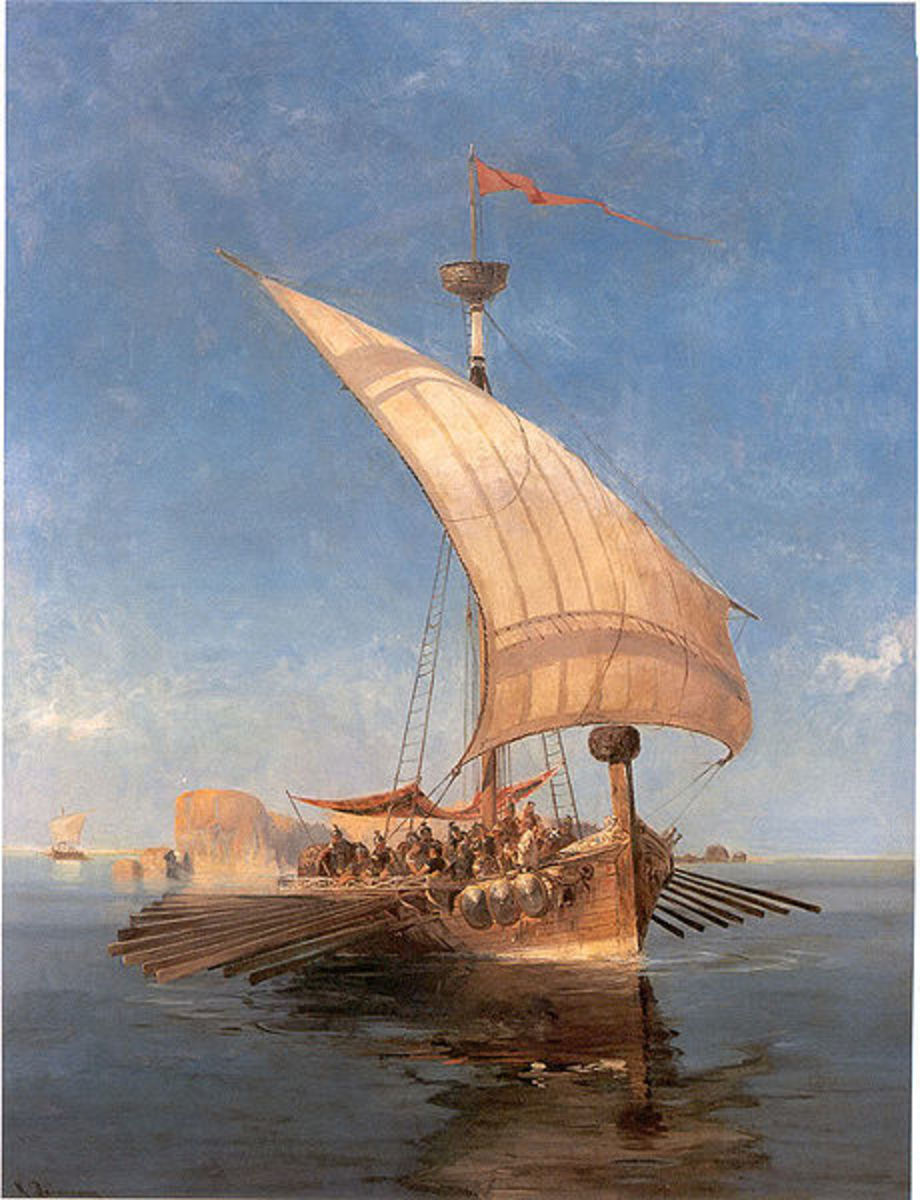Greek Myth of Orpheous and Euridice
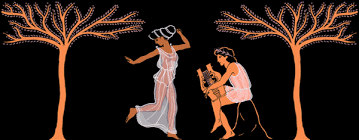
Orpheus and Eurydice
It is said the Greek god Apollo was his father, and the Muse Calliope his mother. He was living in Thrace, on the northeastern part of Greece. The myth says no god or mortal could resist his music and even the rocks and trees yearned to be near him.
According to some ancient texts, Orpheus is said to have taught agriculture, writing and medicine to mankind. He was also said to have been an astrologer, a seer and discovered many mystic rites. Orpheus was also believed to have taken part in the voyage of Jason and the Argonauts to steal the Golden Fleece.
In fact, Orpheus put the "sleepless dragon" guarding the Golden Fleece into a deep trance through the enchantment of his music. Thus, Jason was able to acquire the fleece. Orpheus' music also saved the Argonauts from the Sirens who were seducing men with their musical voices and killing them.
Humans and beasts alike were rendered helpless by his voice. Even inanimate objects longed to hear him. He had mastered the lyre during his youth and his talented voice attracted audiences from around the world. It was at one such gathering he became enamored of a beautiful, shy wood nymph named Eurydice. She also fell under his magical spell, falling helplessly in love with his beautiful music and majestic appearance.
Soon afterward they were married. Hymenaios, the god of marriage, conducted the nuptials and blessed their marriage. Following the ceremony a great banquet was given. As the day came to a close the guests and newly weds left and headed for home. However, things were about change for the joyous couple as they were about to experience much grief and heartache.
Aristaeus, a shepherd, coveted Eurydice for his own and devised a strategy to steal her away. He waited in the bushes for the newlyweds to pass by, intending to ambush and kill Orpheus. As Aristaeus, made his move, Orpheus grabbed Eurydice by the hand and began running through the forest. Orpheus felt Eurydice stumble and fall. Eurydice had been bitten by a deadly viper. Certain she would die and he would be blamed, Aristaeus escaped into the shadows.
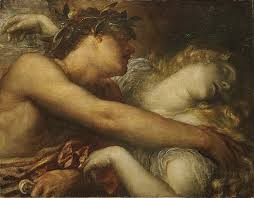
Death of Orpheus
The story of Orpheus and Eurydice is perhaps one of the most famous Greek myths, inspiring many artists, such as Peter Paul Rubens and Nicolas Poussin. Additionally, many operas, songs and plays have been composed in their honor.
The story of Orpheus and Eurydice has been told since ancient times with various versions. However, there seems to be very few differences in the telling. The earliest account comes from Ibycus (circa 530 BC), a Greek lyric poet. Here are a few of these various versions:
It is said Orpheus, on his mother's side, was more than mortal. He was the son of one of the Muses and a Tracian prince. He received the gift of music from his mother. The Thracians were famous for being the most musical in Greece, and they fostered his talents. Orpheus had no rivals. No one and nothing could resist him. Notice the description of Orpheus.
In the deep still woods upon the Thracian mountains
Orpheus with his singing lyre led the trees,
Led the wild beasts of the wilderness.
Everything animate and inanimate followed him. He moved the rocks on the hillside and turned the courses of the rivers.
When and where he first met and courted Euridice, isn't totally clear, but evidently no maiden could resist his song. They were married, but their joy was short lived. Directly after their wedding, as she walked in a meadow with her bridesmaids, she was bitten by a viper and died. Orpheus' grief was overwhelming. He decided to go down to the underworld and try to bring Eurydice back. He said to himself:
With my song
I will charm Demeter's daughter,
I will charm the Lord of the Dead,
Moving their hearts with my melody.
I will bear her away from Hades.
He journeyed to the underworld. There he began playing his lyre, and the multitudes were enchanted.
O Gods who rule the dark and silent world,
To you all born of a woman needs must come.
All lovely things at last go down to you.
You are the debtor who is always paid.
A little while we tarry up on earth.
Then we are yours forever and forever.
But I seek one who came to you too soon.
The bud was plucked before the flower bloomed.
I tried to bear my loss. I could not bear it.
Love was too strong a god, O King, you know
If that old tale men tell is true, how once
The flowers saw the rape of Proserpine,
Then weave again for sweet Eurydice
Life's pattern that was taken from the loom
Too quick. See, I ask a little thing,
Only that you will lend, not give, her to me.
She shall be yours when her years' span is full.
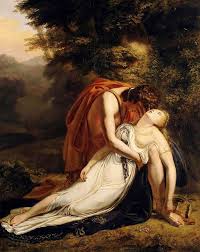
No one under the spell of his voice could refuse him anything.
Eurydice was summoned and returned to him, but upon one condition. He would not look back at her until they had reached the world of the living. So the two took the path which would take them out of the darkness. He knew instinctively she must be close behind him, and he longed to to look back to be certain. But he refrained, fearing the loss of his beloved.
Finally he stepped into the daylight and turned around. However, it was too soon. She had not quite emerged from the cavern, and in an instant she was gone, slipping back into the darkness.
Frantic, and in desperation he tried to follow her down, but the gods wouldn't allow him to enter the world of the dead a second time. He was forced to return to the earth. In utter desolation he isolated himself, avoiding contact with others. He wandered aimlessly through the wilds, his only comfort playing his lyre to his only companions, the rocks, rivers and trees which loved to hear him.
But one day a band of angry women came upon him and tore him limb from limb, perhaps because he had rejected all women. They threw what was left of him into a river. His limbs, head and lyre, floated along past the river's mouth onto the Lesbian shore and into the sea where the Muses found them and buried him in the sanctuary of the island. His limbs were placed in a tomb at the foot of Mount Olympus, and there to this day, it's said the nightingales sing more sweetly than anywhere else.
Here is another version, taken from Thomas Bulfinch and retold by Juliana Podd in Encyclopedia Mythia.
Eurydice and Orpheus were young and in love. So deep was their love they were practically inseparable. They each felt they could not live without the other. These young lovers were very happy and spent their time playing in the meadows.
One day Eurdice and Orpheus were running through a meadow when she was bitten by a poisonous serpent. She died and descended to Hades.
Orpheus was son of the Olympian god Apollo, who was also said to be blessed with musical talents, some say was equal to that of Orpheus. Orpheus was so saddened about the loss of his love he composed music to express his terrible emptiness. He was so overcome with grief, he decided to address Hades. As the overseer of the underworld, Hades heart had to be made of stone, and so it was. Many had approached Hades to beg for loved ones to be returned and almost always were refused. But Orpheus' music was so sweet and moving that softened the heart of Hades. Hades gave permission for Orpheus to bring Eurydice back to the surface of the earth. There was only one condition. Orpheus was not to look back as he led his beloved back to the land of the living. It was a long way back, and just as Orpheus emerged into the sunlight, he looked behind to make sure Eurydice was still there. At that very moment, she was snatched back because she had not quite emerged into the sunlight.
Orpheus and Eurydice
The myth of Orpheus and Eurydice is one of the most famous and beloved Greek myths. A myth about love and passion, and also about the weaknesses of the human spirit.
Orpheus Son of God Apollo
Orpheus was the son of Apollo and Calliope, the Muse. Apollo gave his son a lyre and taught him how to play. Orpheus managed to play so well even Apollo was surprised. It is said nothing could resist his music, neither friends, enemies, or beasts. Even trees and rocks couldn't resist his music and voice.
Orpheus fell in love with Eurydice, a woman of unique beauty. They got married and lived happily for many years. Hymen was called to bless the marriage and he predicted their union was not meant to last for long.
Soon after his prediction, Eurydice was wandering in the forest with the Nymphs, when Aristaeus, a shepherd saw her and was captivated by her beauty. He began making sexual overtures on her. However, Eurydice became frightened and ran away. But she was bitten by a snake and died.
Orpheus sang his grief with his lyre, and both humans and Gods were deeply moved by his sorrow.
Apollo then told his son to descend to Hades to see his wife. Any other mortal would have died, but Orpheus, protected by the Gods, went to the Hades. He managed to enamor Cerberus, the known monster with three heads. Orpheus presented himself in front of the God of the underworld Hades (Pluto) and his wife Persephone.
Orpheus started playing, and even the cold heart of Hades melted. Hades told Orpheus he could take Eurydice with him but with one condition. Eurydice would follow him out of the underworld, but he should not look back at her before she came out into the light of the living. If Orpheus was patient enough he would have Eurydice again at his side.
Orpheus and Eurydice ascending to life.
Orpheus was delighted; he thanked the Gods and left to ascend to the living world. He was trying to hear Eurydice’s steps, but he could not hear them and he started wondering if the Gods had played a trick on him. Of course Eurydice was behind him, but as a shadow, waiting to come to light to become a full woman again. Only a few feet away from the exit, Orpheus lost his faith and turned to see if Eurydice was behind him. As But her shadow was immediately returned to the land of the dead.
Orpheus tried to return to the underworld but a living man can't enter Hades twice. Here, are two different versions of the same myth:
According to the first version, Orpheus started playing a mourning song with his lyre, calling for death so he could be united with his lover forever. Beasts tore him apart, or maybe the Maenads (women), in a frenzied mood.
According to another version, Zeus decided to strike him with lightning because Orpheus might reveal the secrets of the underworld to mankind. In any case, Orpheus died but the Muses decided to save his head and keep it among the living to sing forever.
Background of Orpheus
The mythological tradition names Orpheus as the preeminent musician of the "Golden Age" of heroes. Orpheus' music and song are said to have been so enticing they could charm birds from the trees, soothe Cerberus and bring the Furies to tears.
Orpheus' parentage is unclear, although most scholars agree his mother was the Muse of epic poetry, Calliope. However there is disagreement over the identity of his father. Some claim he was the son of the Thracian king Oeagrus, others say his father was Apollo. Details concerning Apollo's early life are scarce, although it seems his mother and aunts taught him to sing and play the lyre.
Orpheus Marries and becomes an Argonaut
Although one might not expect a famous musician such as Orpheus to be a courageous "hero,” Jason asked Orpheus to join the Argonauts in his search to recover the Golden Fleece for King Pelias. Orpheus' only weapon was his lyre, which he used to raise the spirits of his fellow Argonauts. He also charmed fish from the sea for their long journey.
Orpheus' also dealt with the Sirens. Three bird-women, who lived on an island meadow scattered with bones of their numerous victims. These monsters saying that a seductive songs to passing sailors, luring them onto jagged rocks where their ships would be wrecked. When the Argonauts neared this island, Orpheus began to play his lyre and sang songs to confuse the Sirens, thus saving the crew from a shipwreck.
Before he joined the Argonauts, Orpheus was married to a maiden named Eurydice. Unfortunately the marriage was short-lived, as Eurydice was killed when a poisonous snake bit her heel. There is dispute regarding the manner of her death, some say she was bitten as she danced to Orpheus' music, while others say she was fleeing the advances of Aristaeus, another of Apollo's sons. Still others, such as Ovid, maintain she was killed when roaming with her gay Water nymphs. Regardless, all agree Orpheus was overwrought when he heard of his bride's death, and he was determined to descend into the underworld to bring her back to the land of the living. Ovid tells of how Orpheus appealed to Persephone, queen of the underworld, for the return of his bride. Persephone called Eurydice and gave her back to Orpheus to take out of the underworld, on the stipulation he not look back at his bride until they both stood in the light of the sun. The pair climbed back to the upper world, and Orpheus stepped out into the sunlight. But Orpheus looked back before Eurydice had time to follow. She slipped back into the underworld, dying a double-death.
Orpheus's Insanity
Following his failure to rescue Eurydice from Hades, Orpheus was said to have gone insane, Ovid compares him to Heracles, a hero who similarly visited the underworld and would later be driven to insanity. Despite his efforts, he was not allowed to enter the underworld a second time, and so Orpheus returned to the land of the living.
Living in the wild and spurning the love of women, although many desired him, it is said this behavior is what caused the men of Thrace to love adolescent boys rather than women.
Death of Orpheus
One day, Orpheus was singing in the woods when a group of drunken women came upon him. These women were Maenads, devotees of Bacchus, and in their frenzy they threw stones and branches at Orpheus. Then they attacked Orpheus with their bare hands, tearing him apart. The myth states his head and lyre were cast into the river Hebrus, and landed on the isle of Lesbos. Orpheus' shade then returned to the underworld, searching for Eurydice where he eventually found her in the Elysian Fields.
Since Orpheus had been the bard of Bacchus' mysteries, the god avenged his death by transforming the Maenads into trees. However, most historians dismiss this account, as it is unlikely Bacchus would have his own devotees kill his favorite musician.
Other versions of Orpheus' death do exist. For example, Orpheus is said to have shunned the gods (except Apollo) towards the end of his life and, in one version, Bacchus killed him for abandoning his faith. Still other accounts say Orpheus killed himself after failing to rescue Eurydice, or Zeus struck him with lightning for revealing the mysteries of the gods.
After her death, Orpheus was a changed person, grief-stricken for his lost love. A unique idea then presented itself to him. One that might enable him to be reunited with his wife. Perhaps Apollo, his father, could convince Hades, the god of the underworld, to grant him an audience. Armed with his only weapons, the lyre and voice, Orpheus requested permission to enter the underworld. Orpheus presented his argument, played his lyre and sang to King Hades and his queen, Persephone, imploring for Eurydice to be returned to him. His voice was so moving Hades promised Eurydice could follow him up to the world of the living. However, there was one condition. He warned Orpheus that for no reason must he look back while his wife was still in the dark. He should wait for Eurydice to come into the light before he looked at her. Orpheus began his journey out of the underworld with a joyful heart. Soon he would be reunited with his love. As Orpheus was reaching the exit of the underworld, he could hear his wife close behind. He wanted to turn around and embrace her, but managed to control his feelings. The moment he stepped into the world of the living, he turned to hug his wife. Unfortunately, he got only a glance of Eurydice before she was drawn back into the underworld. Eurydice had not quite made it out of the dark. As Hades had promised a, his wife was returned to the realm of the dead. Waves of anguish and desperation swept over him.
Once again he approached the underworld, but this time, he was not allowed to enter. Zeus had sent the god Hermes to keep the gates shut and deny him entry. From then on, the heart-broken musician wandered aimlessly and disoriented in total despair to the point he could find no consolation in anything. His misfortune tormented him, forcing him to abstain from contact with any other woman. Finally he had nothing to do with them at all. His songs thereafter were sad and devoid of any happiness or joy.
Soon after a group of women, furious for his rejection of women stumbled upon him. Orpheus, in his stricken state of mind, didn't even try to defend himself. The women massacred him, dismembering his body. They tossed his remains and lyre into a river. It is said his head and his lyre floated downriver to the island of Lesbos. There, the Muses gave Orpheus a proper burial. People believed beautiful music emanated from his place of interment. His soul descended to Hades and he was finally reunited with his beloved Eurydice.
If you observe the myth of Orpheus and Eurydice closely, you will find similarities between this tale and the biblical story of Lot. Note the inference of "not looking back."
In the Book of Genesis, when God decided to destroy Sodom and Gomorrah, two cities buried in sin, he told, Lot, to take his family and leave the area. God told them to head for the mountains and not look back upon the devastation he was about to unleash upon the two cities.
While they were leaving Lot's wife couldn't resist and turned around to witness the destruction. She was promptly turned into a pillar of salt! Many believe this is a message about the consequences of disobedience towards God.

